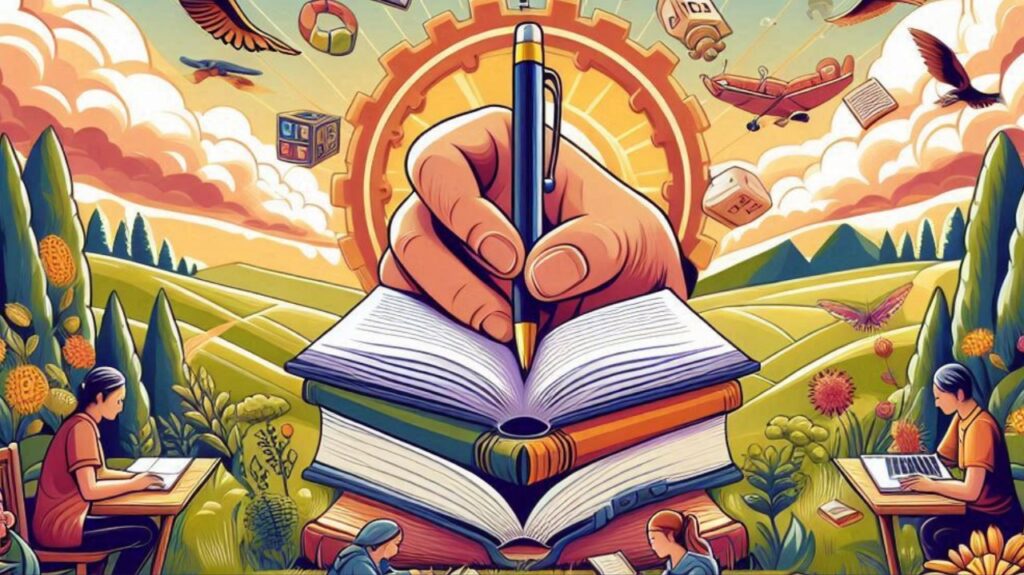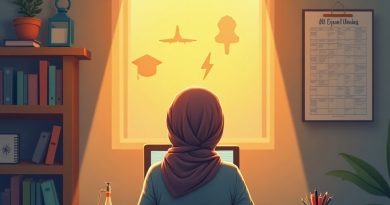Reading and Writing as Pillars of Intellectual Development

By Dr. Abdul Wadud Nafis, LC., MEI
In intellectual life, reading and writing are not just activities taught from an early age; they are the two main pillars supporting the development of human thought. These activities play a crucial role in shaping how we view the world, understand information, and contribute to the advancement of knowledge. However, how often do we realize the profound role that reading and writing play in shaping our intellectual intelligence?
As time progresses, the challenges faced by modern society demand critical, analytical, and creative thinking skills. All these abilities essentially grow and develop through the habits of reading and writing. Reading enriches our insights, provides a deeper understanding, and introduces us to various perspectives of the world. Meanwhile, writing helps us articulate and organize those ideas, making them easier to comprehend and apply in everyday life.
In this article, we will delve deeper into the urgency of reading and writing in intellectual development. We will examine how these activities complement and influence various aspects of human intelligence—from enhancing critical thinking to fostering creativity and logical reasoning. More than just basic skills, reading and writing are pathways to broader personal development, offering opportunities for anyone to continue learning, growing, and contributing to an ever-evolving civilization.
Let us explore the importance of reading and writing in building our intellectual capacity, as well as how these two activities can serve as transformative tools in the journey of becoming a lifelong learner.
Reading and writing play a crucial role in intellectual development, involving more than just mechanical activities; they are processes that build the foundations of knowledge, thinking skills, creativity, and communication. The following is a broader discussion of the urgency of reading and writing in the context of intellectual development:
A. Reading as the Main Gateway to Knowledge
- Expanding Horizons: Reading provides access to a wider world, transcending geographical, cultural, and temporal boundaries. Through reading, one can learn from the experiences and thoughts of people from diverse backgrounds. From scientific texts to literature and history, every reading enriches the understanding of the world and expands intellectual horizons.
- Sharpening Analytical Skills: Reading requires individuals to analyze and interpret information. When someone reads carefully, they are compelled to question, doubt, and understand the arguments or narratives presented, thereby building analytical and critical thinking skills.
- Connecting Ideas: While reading, our brains work by connecting new ideas with existing knowledge. This process enriches intellectual development by relating concepts, theories, and facts that may have previously been separate.
B. Writing as a Form of Deep Understanding
- Clarifying Thoughts: The writing process requires one to organize and structure their thoughts systematically. Through writing, ideas that were initially abstract or vague can be articulated and clarified, providing a deeper and clearer understanding of a topic.
- Documenting and Developing Thoughts: Writing also serves as a tool for recording and developing ideas. Many great thinkers, from philosophers to scientists, have used writing as a medium to test hypotheses and formulate theories based on reflections and knowledge gained through reading.
- Sharpening Arguments: When writing, individuals learn to formulate coherent arguments, build premises, and support their conclusions with logical evidence. This is especially important in intellectual development, particularly for those who wish to engage in academic discussions or public debates.
C. Reading to Develop Critical Thinking Skills
- Evaluating Information: In this digital age, we are bombarded with information from various sources. Critical reading is an important skill that enables individuals to evaluate the validity, bias, and quality of the information they receive. This helps build a more mature and independent intellectual awareness.
- Enhancing Reflective Thinking Skills: When individuals read profound works such as philosophy, literature, or scientific texts, they are invited to reflect, ponder the meanings, implications, and relevance of those ideas in their lives. This aids in the development of a more introspective and reflective intellectual dimension.
D. Writing to Enhance Creativity
- Self-Expression and Ideas: Writing is a crucial means of self-expression. Through writing, individuals can articulate their ideas, emotions, and thoughts in a more structured manner. This process stimulates creativity as writing allows for the exploration of various perspectives and ways of thinking.
- Creating Original Works: Many great works, whether in literature, science, or art, arise from the writing process. An individual’s intellectual creativity can develop when their ideas are expressed in written form, paving the way for the creation of innovative works.
E. Intellectual Development through the Combination of Reading and Writing
- The Dynamics of the Learning Process: Reading and writing complement each other in the learning process. Reading allows individuals to absorb information, while writing enables them to rearrange and reflect on that information. In other words, reading provides input, while writing is an output process, where individuals test and develop their understanding.
- Constructing Arguments and Logical Thinking: Reading rich literature and writing critical responses encourages individuals to develop logical thinking and structured arguments. This assists in the ability to discuss and debate rationally, which is an essential element of intellectual development.
F. Maintaining Knowledge and Memory
- Retaining Information: Knowledge gained through reading can quickly be forgotten if not stored or utilized. Writing is an effective way to keep knowledge alive in our memory because the writing process allows us to process and reorganize information in a way that we can understand and remember.
- Preserving Intellectual Sensitivity: The habit of writing keeps individuals in a continuous state of learning and thinking. Regularly writing articles, essays, or personal journals can maintain intellectual acuity and ongoing development.
G. Enhancing Communication Capacity
- Effective Communication: Reading and writing are invaluable communication skills. Through reading, individuals can learn different styles of language, understand language nuances, and appreciate the beauty of rhetoric. With writing, individuals can practice conveying ideas clearly and effectively to others, both verbally and in writing.
- Intellectual Collaboration: In academic or professional settings, reading and writing are often collaborative activities. Reading others’ works and then writing responses or critiques allows for intellectual dialogue that can enrich both parties.
H. Reading and Writing in the Context of Modern Life
- Facing the Information Era: In this fast-paced information age, the ability to read critically and write effectively is becoming increasingly important. In many professions, the ability to write reports, create presentations, or communicate ideas through writing is a primary requirement.
- Sharpening Adaptability and Lifelong Learning Skills: Reading and writing foster openness to new ideas and adaptability to changing knowledge. This is essential for ongoing intellectual development, where individuals continue to learn throughout their lives, sharpening their minds and adjusting to the demands of the times.
Conclusion
The urgency of reading and writing in intellectual development cannot be separated. Both are primary tools in building knowledge, critical thinking, expressing ideas, and enriching communication skills. Reading introduces us to a world of ideas, while writing allows us to process, organize, and disseminate those ideas effectively. Together, they encourage individuals to continue growing and developing in intellectual and creative realms.
After understanding the urgency of reading and writing in intellectual development, we realize that these activities are not merely routines, but the foundational pillars for personal and social growth. Reading enriches our perspectives and broadens our thinking horizons, while writing helps structure and express ideas more clearly and profoundly. They complement each other in building critical, analytical thinking capacities, as well as strong argumentative abilities.
In the context of modern life, where information is abundant and challenges are increasingly complex, the ability to read critically and write effectively becomes a valuable asset. Those who continually hone these two skills will have an advantage in facing the changes of the times and will contribute to the development of knowledge and community life.
Therefore, reading and writing should not be viewed merely as obligations, but as means for continuous learning and intellectual growth. These activities open the door to becoming lifelong learners who continue to develop themselves and positively impact their surroundings.
Ultimately, reading and writing are bridges to broader understanding and more meaningful contributions in life. By cultivating these habits, we not only enrich ourselves but also participate in building a more advanced, open-minded, and innovative civilization.
References
1. Dewey, J. (1910). How We Think. Boston: D.C. Heath & Co.
2. Freire, P. (1970). Pedagogy of the Oppressed. New York: Continuum.
3. Carr, N. (2011). The Shallows: What the Internet is Doing to Our Brains. New York: W.W. Norton & Company.
4. Smith, F. (1994). Understanding Reading: A Psycholinguistic Analysis of Reading and Learning to Read. Hillsdale, NJ: Lawrence Erlbaum Associates.
5. Emig, J. (1977). Writing as a Mode of Learning. College Composition and Communication, 28(2), 122-128.
6. Zinsser, W. (2006). On Writing Well: The Classic Guide to Writing Nonfiction. New York: Harper Perennial.
7. Bloom, H. (1994). The Western Canon: The Books and School of the Ages. New York: Harcourt Brace & Company.
8. Heath, S.B. (1983). Ways with Words: Language, Life and Work in Communities and Classrooms. Cambridge: Cambridge University Press.


